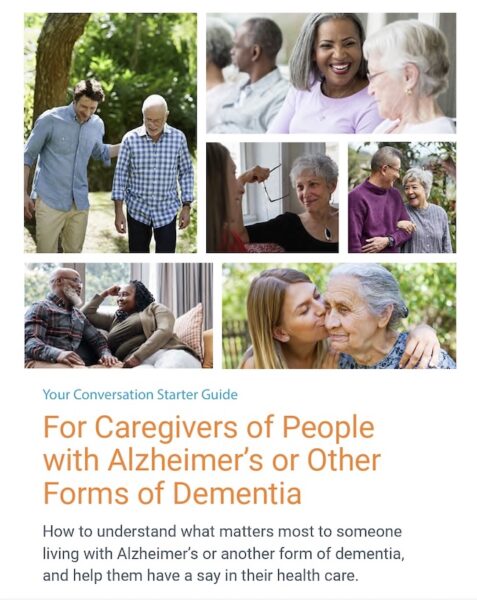Let's be honest: few conversations feel more daunting than those about end-of-life wishes, especially when a loved one has Alzheimer's. The fear of saying the “wrong thing,” causing upset, or not knowing where to start can cause us to put it off—even when we know it's one of the most important discussions we'll ever have.
But what if you had a gentle, structured way to begin? This Alzheimer's End-of-Life Conversation Kit is designed to do just that, transforming an overwhelming prospect into a series of manageable, compassionate steps that honor your loved one's voice and values.

End of Life Conversations are Essential when People have Dementia
We all have a tendency to avoid conversations about death or dying, but it’s necessary to know what an aging adult’s end-of-life wishes are.
That’s especially true if they have Alzheimer’s disease or dementia and most likely won’t be able to communicate their wishes during the later stages of the disease.
Talking about end-of-life care is essential because it helps you understand how your older adult would choose to live in their last months, weeks, and days.
These can be stressful things to guess at if you’ve never talked about it, so experts recommend starting end-of-life discussions as soon as possible.
Too many people are dying in ways they wouldn’t choose and too many family members feel guilty because they’re unsure about their older adult’s wishes.
We found an excellent free guide from The Conversation Project that helps you start these conversations in the earlier stages of dementia.
It also includes tips on how to make decisions on someone’s behalf if their dementia is advanced and they can no longer express their own thoughts.
Here, we share what’s included in the guide.
Free Guide for End-of-Life Conversations

The Conversation Project is a non-profit organization that’s dedicated to helping people talk about their wishes for end-of-life care.
They’ve created an excellent free Conversation Starter Kit specifically for people with Alzheimer’s or dementia. Having a guide makes these extra-challenging conversations a little bit easier.
Caring for someone with dementia is a long-term commitment that can have many challenges. This guide was created to help you, someone who cares, prepare yourself and others to make health care decisions for the person you are caring for as the need arises. The Conversation Project wants to help everyone talk about their wishes for care through the end of life, so those wishes can be understood and respected. – The Conversation Project
VIDEO: Having the End-of-Life Conversation
What’s Included in the End-of-Life Conversation Starter Kit?
The information is straightforward and broken up into 4 sections. Here’s an overview of what’s covered:
Section 1: Prepare
Having these conversations is difficult and you may wonder if it’s too soon to start talking about it.
This section explains why it’s never too soon to start the discussion, how to approach it, and how to deal with it if they insist there’s “nothing wrong with them” or react negatively.
Think about how and why you should start a conversation with the person you care for, sooner rather than later, and understand how to overcome common barriers. – The Conversation Project
Section 2: Talk
This section starts with advice on how to approach the conversation depending on the person’s dementia stage—early, middle, or late.
There are also tips for how to use the guide if your older adult can no longer speak for themselves because their dementia is more advanced.
The majority of the section consists of questions that help guide you through what to discuss and key decisions for end-of-life care.
Learn some helpful approaches to starting a conversation, and some things you can talk about so you understand what matters to the person in their life and in their health care. – The Conversation Project
Step 3: Advocate
After you’ve had the conversation, you now have a better idea of what your older adult’s end-of-life wishes are.
This step helps you ensure that their care team also knows their wishes by sharing this document and completing official forms with doctors, hospitals, assisted living facilities, nursing homes, etc.
Learn how to be the best possible advocate for the person you care for, and how to make sure that person’s health care team understands their wishes and decisions. – The Conversation Project
Step 4: Learn From Others
This section includes stories that share advice and stories from people who have been through end-of-life care for someone with Alzheimer’s or dementia.
Find some helpful advice from people who have cared for someone with dementia. – The Conversation Project
Final Thoughts
Having this conversation is not about giving up; it's about pouring your love and respect into a plan that ensures your loved one's wishes are at the center of every decision to come. While it may feel challenging, using this kit is a profound act of care that can lift a heavy burden of uncertainty from your shoulders.
You are gifting your entire family with clarity and peace during a time that will already be emotionally complex. Take a deep breath, gather the materials, and take that first brave step. By doing so, you are creating a lasting guide built on love, not guesswork.
Next Steps: Get the free end-of-life conversation starter kit for Alzheimer’s disease and dementia at The Conversation Project in English, Chinese, or Spanish and an English language audio guide
Recommended for you:
- Simple End-of-Life Planning: The Five Wishes Living Will
- Which End-of-Life Form Is Needed? POLST vs DNR
- 5 Essential End-of-Life Documents for Seniors
About the Author

Connie is the founder of DailyCaring.com and was a hands-on caregiver for her grandmother for 20 years. (Grandma made it to 101 years old!) She knows how challenging, overwhelming, and all-consuming caring for an older adult can be. She also understands the importance of support, especially in the form of practical solutions, valuable resources, and self-care tips.













